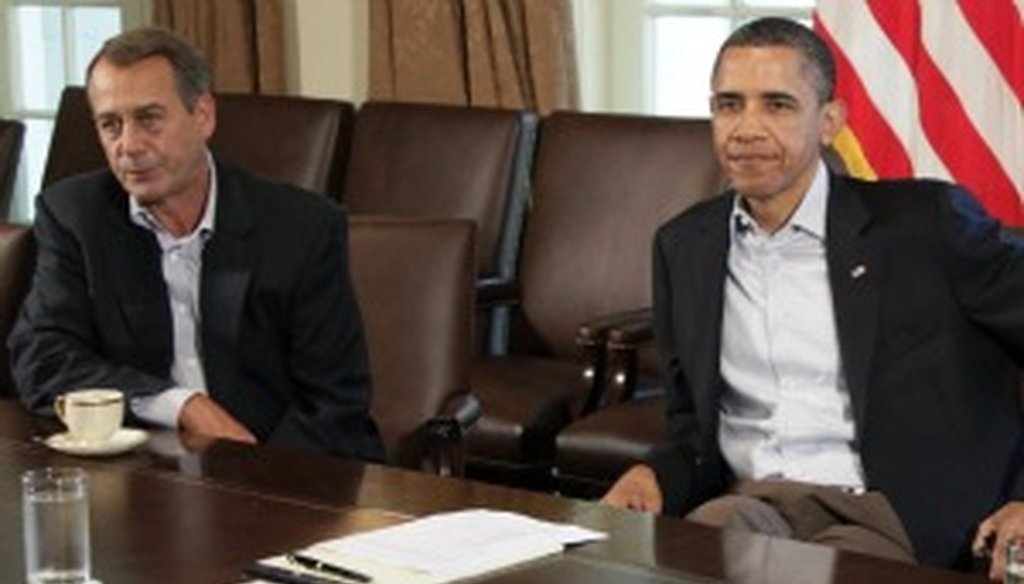Stand up for the facts!
Our only agenda is to publish the truth so you can be an informed participant in democracy.
We need your help.
I would like to contribute

House Speaker John Boehner and President Barack Obama met in the White House on July 23 for talks on raising the nation's debt celing.
The daily back-and-forth in Washington over the federal government’s finances has provided numerous opportunities for the Truth-O-Meter and PolitiFact researchers.
For weeks, President Barack Obama and congressional leaders have been arguing over a deal to raise the debt ceiling — the legal limit on how much money the government can borrow. After hitting the limit earlier this year, the U.S. Treasury Department juggled accounts to buy time for further negotiations. But officials now expect the debt limit to be reached Aug. 2.
Various plans have been introduced in Congress that would raise the $14.3 trillion debt ceiling while also reducing the federal deficit, but as of Friday, no consensus had been reached.
There’s been disagreement about the consequences of not raising the limit.
President Barack Obama has said that failure to increase the $14.29 trillion ceiling would leave the nation unable to meet all its financial obligations. On July 12, he told CBS News that without a deal, Social Security and other federal checks may not go out Aug. 3. PolitiFact National rated that statement Half True. There are likely steps that can be taken to make sure Social Security checks continue to go out, but the situation is still uncertain.
The day after Obama’s CBS interview, U.S. Rep. Michele Bachmann, R-Minn. — a contender for the 2012 Republican presidential nomination — played down the potential impact of a failure to raise the debt ceiling.
During a July 13 press conference, Bachmann said: "This is a misnomer that I believe that the president and the Treasury Secretary have been trying to pass off on the American people, and it is this — that if Congress fails to raise the debt ceiling by $2.5 trillion, that somehow the United States will go into default and we will lose the full faith and credit of the United States. That is simply not true."
PolitiFact National explored her statement in a July 16 story, although it ultimately decided against rating it on the Truth-O-Meter.
Another frequent subject of discussion during the debt crisis debate: what "the American people" want Congress and the president to do.
During a July 15 press conference, Obama said that "80 percent of the American people support an approach (to reducing the federal deficit) that includes revenues and includes cuts." PolitiFact National rated that statement Mostly True, finding that the president's overall point was correct but that most polls had put the figure in the 50 percent to 70 percent range.
The same day, Obama also said that even Republican voters "think that any deficit reduction package should have a balanced approach and should include some revenues." PolitiFact National rated that Barely True. At the time, different polls showed different results, with Republicans sometimes evenly split or even opposed.
PolitiFact Texas looked at polling on the debt crisis after Josh Treviño, a spokesman for the conservative Austin-based Texas Public Policy Foundation, said during an MSNBC appearance July 13 that the day before, Gallup had released a poll "that had 42 percent of Americans, a plurality, opposed to raising the debt ceiling."
He continued: "And today we had a Gallup poll showing 50 percent versus 11 (percent) on the other side thinking that the debt and the deficit should be dealt with by mostly spending cuts. So the Republicans are on the side of the American people here, and I think that’s pretty clear."
We rated his claim about the recent polls Mostly True.
After the president, the most visible figure in the Washington debt debate has been U.S. House Speaker John Boehner, R-Ohio. In a July 26 speech, he touted the House's approval of the "Cut, Cap and Balance Act," which he said "cuts and caps government spending and paves the way for a balanced budget amendment to the Constitution." And he portrayed that vote — in which five Democrats joined with 229 Republicans in support of the legislation — as a bipartisan achievement.
In its check of that claim, PolitiFact National found that it's common for both parties to claim bipartisan support, even when the numbers of supporters from the opposite party can be counted on one hand, as in this case. Boehner's claim was rate Barely True.
History has also been a common subject during the debt debate.
In a July 21 interview with NPR, Obama invoked President Ronald Reagan for support. "You've got some members of the Republican Party who've been downplaying the consequences of default," Obama said. "The irony is, you know, Ronald Reagan, I think, when he was president, repeatedly talked about how irresponsible it would be to allow the full faith and credit of the United States to be impaired in any kind of way."
PolitiFact National rated that Mostly True. Reagan's main themes were lower taxes and less spending, but he also talked about the importance of not allowing for the creditworthiness of the United States to be questioned.
Obama mentioned Reagan again in a July 25 televised address to the nation, saying that Reagan raised the debt ceiling 18 times and President George W. Bush had done so seven times. PolitiFact National rated that claim True while noting that Obama, as a senator, had voted against a similar measure when Bush was president — a vote he now says he regrets.
Finally, PolitiFact Florida rated False a July 27 claim by Republican U.S. Rep. Allen West that Boehner’s plan was the first time that a debt ceiling vote had ever been paired with spending cuts. A 1997 agreement between President Bill Clinton and House Republicans led by Speaker Newt Gingrich included net reductions in direct spending of $122 billion over five years and increased the debt limit to $5.95 trillion, from $5.5 trillion, according to a 2005 analysis from the Congressional Research Service.
More fact-checks of claims related to the federal budget are here.
Our Sources
See related statements.









































